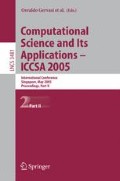Abstract
In this paper, we present a physical random number generator (RNG) for cryptographic applications. The generator is based on alpha decay of Americium 241 that is often found in common household smoke detectors. A simple and low-cost implementation is shown to detect the decay events of a radioactive source. Furthermore, a speed-optimized random bit extraction method was chosen to gain a reasonable high data rate from a moderate radiation source (0.1 μCi). A first evaluation by applying common suits for analysis of statistical properties indicates a high quality of the data delivered by the device.
This work was partially funded by by the European Union in the Network of Excellence FIDIS and the German Federal Ministry of Education, Science, Research and Technology (BMBF) in the framework of the Verisoft project under grant 01 IS C38. The responsibility for this article lies with the authors.
Access this chapter
Tax calculation will be finalised at checkout
Purchases are for personal use only
Preview
Unable to display preview. Download preview PDF.
References
Monrose, F., Reiter, M.K., Li, Q., Wetzel, S.: Cryptographic key generation from voice. In: Proceedings of the IEEE Symposium on Research in Security and Privacy, pp. 202–212 (2001)
Murry, H.F.: A general approach for generating natural random variables. IEEE Transactions on Computers, 1210–1214 (1970)
Thomson, W.E.: Ernie - a mathematical and statistical analysis. Journal of the Royal Statistical Society Series B 101 , 301–333 (1959)
Jun, B., Kocher, P.: The intel number generator. White paper prepared for intel corporation. Cryptography Research, Inc. (1999)
Stefanov, A., Gisin, N., Guinnard, O., Guinnard, L., Zbinden, H.: Optical quantum random number generator. Online (1999)
Figotin, A., Vitebskiy, I., Popovich, V., Stetsenko, G., Molchanov, S., Gordon, A., Quinn, J., Stavrakas, N.: Random number generator based on the spontaneous alpha-decay. U.S. patent Appl. No.: 10/127,221 (2003)
Gude, M.: Ein quasi-idealer Gleichverteilungsgenerator basierend auf physikalischen Zufallsphänomenen. PhD thesis, RWTH Aachen (1987)
Lide, D. (ed.): CRC Handbook of Chemistry and Physicas, 84th edn. CRC Press, Boca Raton (2003)
Haight, F.A.: Handbook of the Poisson Distribution. John Wiley & Sons Inc., Chichester (1967)
Koutsky, Z.: Theorie der Impulszähler und ihre Anwendung. Aplikace Matematiky 7, 116–138 (1962)
Vincent, C.H.: The generation of truely random binary numbers. Journal of Physics E: Scientific Instruments 3, 594–598 (1970)
Gude, M.: Concept for a high performance random number generator based on physical random phenomena. Frequenz 39, 187–190 (1985)
Vincent, C.H.: Precautions for accuracy in the generation of truely random binary numbers. Journal of Physics E: Scientific Instruments 4, 825–828 (1971)
Kraus, G.: Stochastische Abhängigkeit von in schneller Folge erzeugten gleichverteileten diskreten Zufallsereignissen. Frequenz 35, 274–277 (1981)
Walker, J.: Hotbits. Online (2003), http://www.fourmilab.ch/hotbits/
von Neumann, J.: Various techniques used in connection with random digits. Applied Mathematics Series, pp. 36–38 (1951)
Rohe, M.: RANDy - A True-Random Generator Based on Radioactive Decay. Technical report, Saarland University (2003), http://www-krypt.cs.uni-saarland.de/projects/randy/
Pitman, J.: Probability. Springer, New York (1993)
Marsaglia, G.: Diehard battery of tests of randomness (The Marsaglia random number CDROM)
Rukhin, A., Sato, J., Nechvatal, J., Smid, M., Barker, M., Leigh, S., Levenson, M., Vangel, M., Banks, D., Heckert, A., Dray, J., Vo, S.: A statistical test suite for random and pseudorandom number generators for cryptographic applications. NIST Special Publication (2001)
Schindler, W.: Efficient online tests for true random number generators. In: Koç, Ç.K., Naccache, D., Paar, C. (eds.) CHES 2001. LNCS, vol. 2162, p. 103. Springer, Heidelberg (2001)
Author information
Authors and Affiliations
Editor information
Editors and Affiliations
Rights and permissions
Copyright information
© 2005 Springer-Verlag Berlin Heidelberg
About this paper
Cite this paper
Alkassar, A., Nicolay, T., Rohe, M. (2005). Obtaining True-Random Binary Numbers from a Weak Radioactive Source. In: Gervasi, O., et al. Computational Science and Its Applications – ICCSA 2005. ICCSA 2005. Lecture Notes in Computer Science, vol 3481. Springer, Berlin, Heidelberg. https://doi.org/10.1007/11424826_67
Download citation
DOI: https://doi.org/10.1007/11424826_67
Publisher Name: Springer, Berlin, Heidelberg
Print ISBN: 978-3-540-25861-2
Online ISBN: 978-3-540-32044-9
eBook Packages: Computer ScienceComputer Science (R0)

